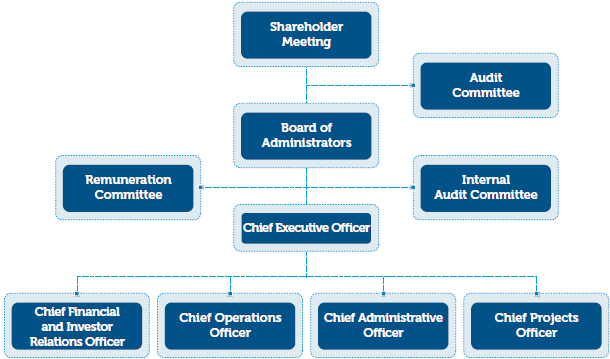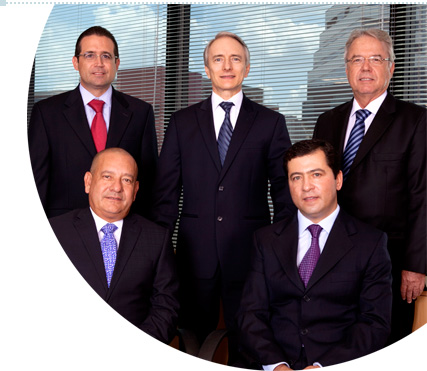Corporate
Governance
The Company's corporate
governance values ethics and
transparency regarding
stakeholders.
Board of Directors
Audit Committee
Chief Executive and Executive Board Our Guidelines
Code of Ethics
Adhesion to the Global Compact
Recognition
Introdution
GRI 4.1, 4.2, 4.3, 4.4, 4.6, 4.7, 4.10
The corporate governance practices adopted by the CTEEP value ethical and transparent relationships with Company shareholders and other stakeholders and are made evident in the disclosure of information to the market.
These practices are aimed at cooperating with the understanding of the Company's real value, facilitating its access to capital and contributing to its longevity. CTEEP best practices were reinforced in 2010 with Board of Directors approval of the Company Code of Ethics and the Code of Corporate Governance.
CTEEP is at Level 1 on the BM&FBOVESPA Differential Corporate Governance Practices. In some aspects, the Company meets higher governance criteria than required by BM&FBOVESPA, such as the structure of its ten-member Board of Directors – Level 1 recommendations are for a minimum of three with Level 2 at a minimum of five. One of the Board Members is a Company employee representative. Financial statements are also available in English on the Company's website, a requirement that is only found in Level 2 and New Market regulations.
Preferential shares (TRPL4) in CTEEP are listed on IBOVESPA, the most important indicator of average performance of prices on the Brazilian market. The Company is part of the GCI (Corporate Governance Index), where companies with special standards of corporate governance and unique relationships with shareholders and other stakeholders are listed; it is also part of the IBrX – Brazil Index, an index of the most traded stocks on the BM&FBOVESPA. Moreover, the Company takes part in the American Depositary Receipts (ADRs) program – Rule 144 A, in the United States.
The Material Act or Fact Disclosure Policy establishes rules for disclosing material information and keeping it confidential. Along with the Securities Exchange Policy, the relationship between shareholders, the Board of Directors, the Audit Committee and the Executive Board are based on the Code of Corporate Governance.
Organization Chart
GRI 4.7
Qualified and experienced professionals are part of the councils and committees that play a fundamental role, in forums on decisions and general orientation for Company business.
The Board of Directors and the Audit Committee hold a prominent position in the corporate governance structure used by CTEEP.
Résumés for the members of the Board of Directs, Committees, and the Executive Board, as well as their experience in relation to socio-environmental issues, can be found on the Reference Form that is available on the Brazilian Securities and Exchange Commission website (www.cvm.gov.br) or on the Company Investor Relations webpage (www.cteep.com.br).

Board of Directors
Focusing on creating value for shareholders, the Board of Directors is the central forum for decision making and defining the general direction of CTEEP business.
The Board is made up of ten members with terms of one year, elected at the Shareholder Meeting. From them a Chairperson and Vice Chairperson are chosen. The Board has an independent member, a minority shareholder representative and an employee representative.
Pursuant to best corporate governance practices, the Chairperson of the CTEEP Board of Directors is not a member of the Executive Board.
The Board is responsible for choosing Executive Board members and auditing business management; assessing the Administrative Report, Financial Statements and Executive Board accounts; approving budgets and plans for finances and project execution; selecting and dismissing Independent Auditors. Although it is an important instrument of corporate governance, the Board does not have a self-assessment model.
Board of Directors meetings are held regularly on dates set on an annual calendar that is approved at the first meeting of each fiscal year and are held extraordinarily whenever called by the Chairperson or when requested by a majority of the Board's members.
In 2011, the Board of Directors met 16 times at six face-to-face meetings and ten meetings held using electronic communication.
Members of the Board of Directors
On December 31, 2011, the Board of Directors had the following members:
Chairman
Luis Fernando Alarcón Mantilla
Vice Chairman
Fernando Augusto Rojas Pinto
Board Members
Fernando Maida Dall´Acqua (independent)
Isaac Yanovich Farbaiarz
Juan Ricardo Ortega López
Julián Darío Cadavid Velásquez
Luisa Fernanda Lafaurie Rivera
Orlando José Cabrales Martinez
Sinval Zaidan Gama
(minority shareholder representative)
Valdivino Ferreira dos Anjos
(employee representative)
Committees
CTEEP maintains two committees to advise the Board of Directors on matters related to auditing and pay.
Internal Audit Committee
Comprised of four members of the Board of Directors and one corporate auditor from Grupo ISA, the aim of the Internal Audit Committee is to strengthen the system of internal controls, risk management and corporate governance practices.
The committee is also tasked with increasing the effectiveness of internal auditing, monitoring and assessing the work of independent auditors, approving the Annual Internal Audit Plan, supervising its fulfillment and ensuring implementation of improvement recommended by internal and external auditors.
The committee meets at least three times annually. In 2011, four face-to-face meetings were held.
CTEEP has an Internal Audit Plan for a three year cycle, wherein 100% of the units (regional units and headquarters) are audited. This plan considers assessment of risks in processes, including the risk of corruption.
Members
Fernando Maida Dall'Acqua
Sinval Zaidan Gama
Isaac Yanovich Farbaiarz
Julián Darío Cadavid Velásquez
John Jairo Vásquez López
Remuneration Committee
Made up of three members of the Board of Directors, this committee is responsible for monitoring, analyzing and proposing topics related to officer and board member pay, nominating Executive Board members, positions and salaries, salary policy, variable remuneration, profit sharing (PLR, its acronym in Portuguese) and collective bargaining agreements.
Members
Luiz Fernando Alarcón Mantilla
Luisa Fernanda Lafaurie Riviera
Orlando José Cabrales Martinez
Audit Committee
Permanent in nature, the CTEEP Audit Committee is an independent Company administration entity, comprised of three to five effective members and an equal number of alternates with one year terms, chosen at the Shareholder Meeting, with no term limits. Of this total, two members are nominated by minority shareholders.This Committee is responsible for auditing Administration acts, examining and providing opinions on financial statements and reporting its conclusions to shareholders. In accordance with the Law on Publically Traded Corporations, the Audit Committee may not contain any members who participate in other administration entities, Company employees or employees of a controlled organization or from the same group, or administrator spouses or relatives. In 2011, nine Audit Committee meetings were held.
Chief Executive
and Executive Board

The CTEEP Executive Board is made up
of five members, including one Chief
Executive Officer, one Chief Financial and
Investor Relations Officer, one Chief
Administrative Officer, one Chief
Operational Officer, and one Chief Projects
Officer, all elected by the Board of Directors
to three year terms.
The Executive Board is responsible for managing
the business and actions necessary for the Company
to function normally, managing the Company's day to
day operations in line with the guidelines set by the Board
of Directors, and focusing on striving for results.
Among other duties, it is the Executive Board's responsibility to: submit a
capital increase
proposal to the Board of Directors and reform the Articles of Incorporation;
recommend acquisition,
alienation or encumbrance of assets, raising of resources and obtaining
loans when the operation surpasses 2%
of company capital; present financial statements for the
fiscal year and
annual and pluriannual financial and project
execution plans and budgets to the Board of Directors.
Members of the Executive Board
César Ramírez (Chief Executive Officer)
An Electrical Engineer, he began his career at ISA as an Engineer for Real Time Operation of the National Interconnected System. He was also the Head of the Department of Energy Planning, Head of the Industry Relations and Department and Corporate Strategy Director, in charge of Strategy Direction and for the corporate group's New Business. He has been being the Chief Executive at CTEEP since 2009.
Celso Sebastião Cerchiari (Chief Operating Officer)
An Electrical Engineer, he is a member of the Board of Directors for the Operador Nacional do Sistema (ONS). He started at CESP in 1976 as a Junior Engineer, developing his career in the operations areas and at the helm of important transmission centers.
Jorge Rodriguez Ortiz (Chief Projects Officer)
An Electrical Engineer, he started at ISA in 1979 as a software engineer. He worked in several areas such as analyses and contracts, he managed and implemented the SAP information system and was responsible for managing important projects to expand the electrical energy transmission network in Colombia. He has been the Chief Projects Officer at CTEEP since 2007.
Pío Adolfo Bárcena Villarreal (Chief Administrative Officer)
A Lawyer experienced in the electrical industry and with infrastructure projects, he worked as an Administrative Manager at the Transelca company for nine years and started at CTEEP as the Chief Administrative Officer. He is a member of the Board of Directors at IEMG, IESul, Pinheiros and Serra do Japi.
Marcio Lopes Almeida (Chief Financial
and Investor Relations Director)
An Economist, he started at CTEEP in May 2007 as the Manager of the Financial Department. He worked on restructuring the financial area and led projects such as the securing financing. He is a member of the Board of Directors at IEMG, IESul, Pinheiros, Serra do Japi, IE Madeira and IE Garanhuns.
Our Guidelines
GRI 4.6
The Code of Corporate Governance, along with the Articles of Incorporation, the Internal Regiment of the Audit Committee and the Code of Ethics, outline the set of practices adopted by CTEEP with the goal of strengthening the transparency of management, increasing the Company's institutional value and access to its capital by investors. Among the documents that make up the Code of Corporate Governance are the Material Fact or Act Disclosure Policy and the Securities Exchange Policy, aimed at aligning executive behavior with the interests of shareholders and the Corporation.
Code of Ethics
GRI 4.6, 4.8, 4.9, HR4, SO3, SO4
GC 1, 6, 10
The CTEEP Code of Ethics guides the conduct and behavior of all of the employees, board members, managers, services providers and temporary workers in their professional relationships with the Company's various stakeholders, following ethical principles and honest, constructive, upstanding and socially responsible conduct.
Launched in 2010, the Code of Ethics is the expression of the Company's philosophy and corporate values and strengthens its corporate identity and institutional coherence. The Code of Ethics was built with employee participation, it is based on the Law of Publically Traded Corporations (Law No. 6,404/76 and updates) and it is in line with the ethical principles that apply to ISA and to its companies.
CTEEP understands ethical attributes to be:
Transparency – Work in a manner that is reliable, accessible, clear and honest.
Reciprocity – Respect for the dignity of those with whom the Company has relationships, in an environment of mutual recognition of the obligations and rights of the parties involved.
Responsibility – Commitment to fulfill promises and comply with the Organization's parameters, policies and standards.
Diversity – Recognition that the difference between people contributes to an environment of respect and enriches the Organization in the places and cultures where it operates.
Commitment – The duty of employees to fulfill their responsibilities in order to achieve the objectives of the Organization's mission. This means executing the work and tasks put to them at the Company with care and dedication.
The Code is managed by the Internal Ethics Committee, whose goal is to assess manifestations and provide the necessary resolution in adopting actions in the case of noncompliance. In 2011, CTEEP did not identify any cases of discrimination or corruption at the Company.
Relationship channels
With the purpose of incorporating the ethical attributes established, the Company has created tools to raise awareness and monitor anti-ethical and anti-corruption issues among employees and other stakeholders.
In 2011, the Ethics Line was launched as an exclusive electronic communication
(www.canalconfidencial.com
.br/linhaeticacteep) and telephone (0800 777-0775) channel to submit questions, criticism and complaints. The Ethics Line strives to keep information and informants confidential and to resolve the questions it receives.
CTEEP also maintains an Ombudsman as a last resort for serving the external public. This public is advised to use the Ombudsman when the other channels for contact with the Company (Ethics Line and Contact Us) have not appropriately resolved some issue.
To publicize the Code of Ethics, the Company has promoted the distribution of this document to all stakeholders. In the first half of 2011, a publicity campaign was held among all of the employees, with the support of educational videos on attitudes that should be adopted and those that should be avoided; all of the material is available on the intranet.
Adhesion to the Global Compact

Adhesion to the United Nations
Global
Compact in 2011 is in line
with the ethical
principles that are
part of the day to day
at CTEEP
of respecting human rights, labor
rights
and environmental rights. The Company
does not hire child labor and requires that
third
parties and suppliers do the same
through a contractual
clause. There are no
areas under Company influence with
significan
t risks of forced, slave or child labor.
Recognition
GRI 2.10
CTEEP is a benchmark company in the electrical energy transmission market. It has accumulated the best performance indicators in the industry, which granted it the additional Allowed Annual Revenue award for the third year in a row in 2011, for the high availability of its assets.
In 2011, CTEEP received the APIMEC (Association of Capital Market Investment Analysts and Professionals) of São Paulo Seal of Attendance, for the Company's ten years of continued participation at association meetings.
The Company was also a finalist in The Best Companies for Internships award, given by the CIEE (Center of School-Company Integration) in partnership with Ibope Inteligência and the ABRH (Brazilian Association of Human Resources). In the overall ranking, the Company is among the top 35 companies.